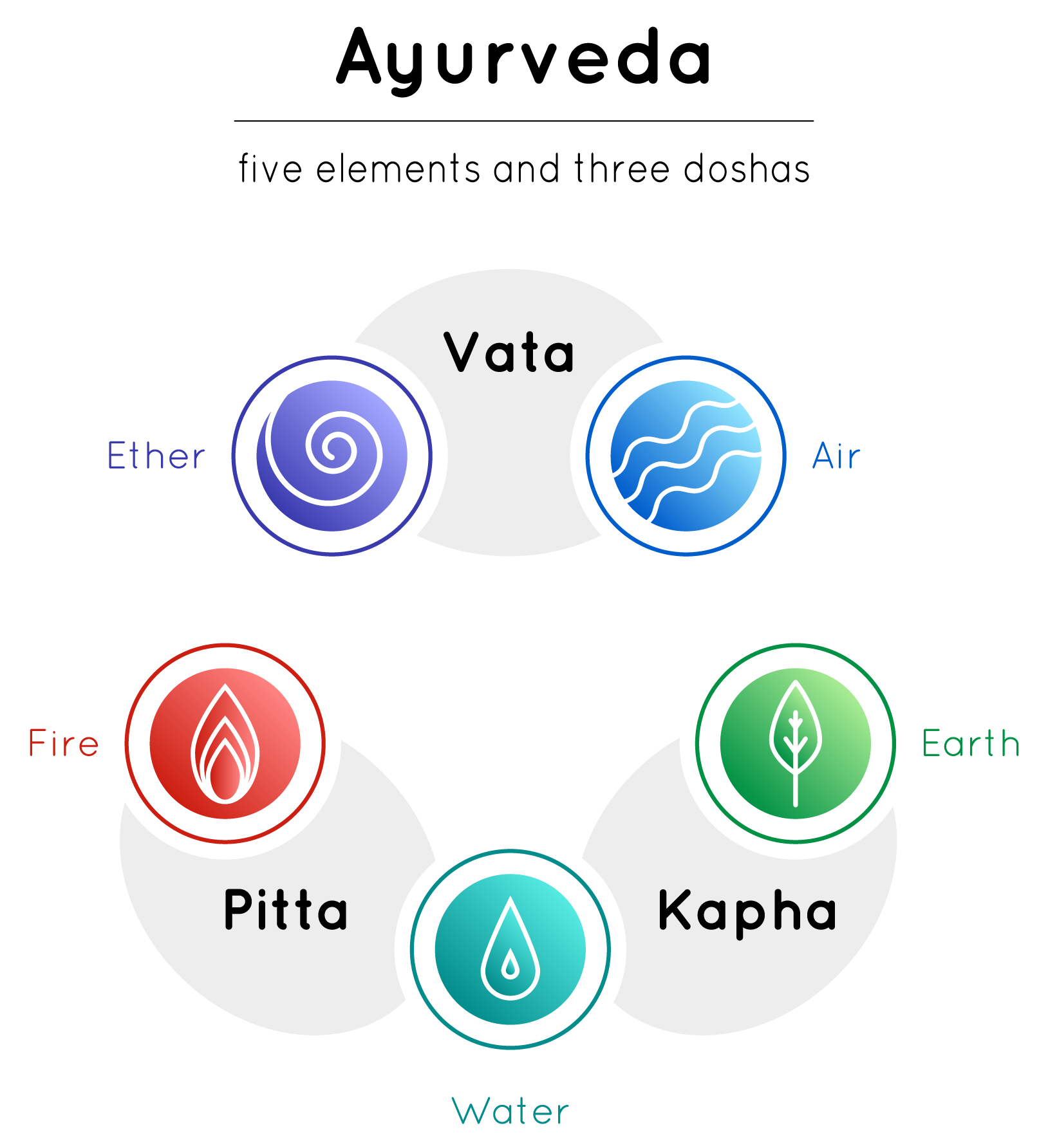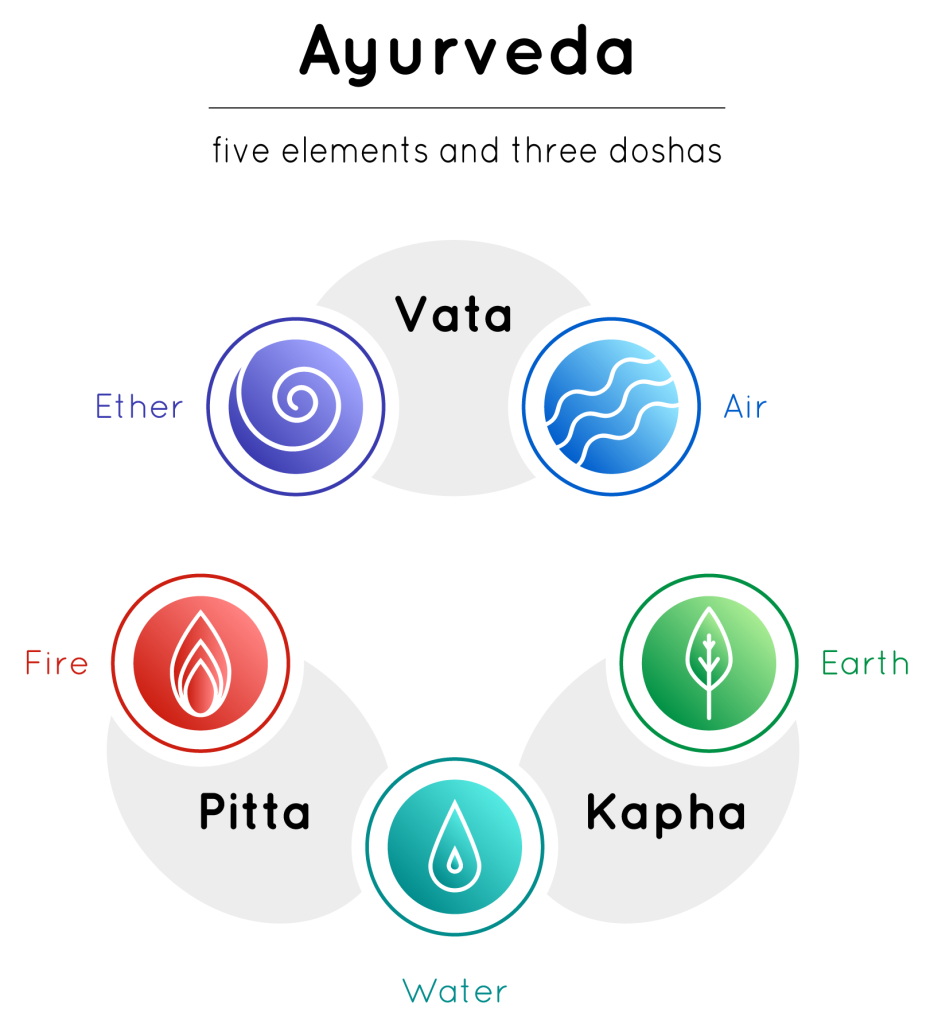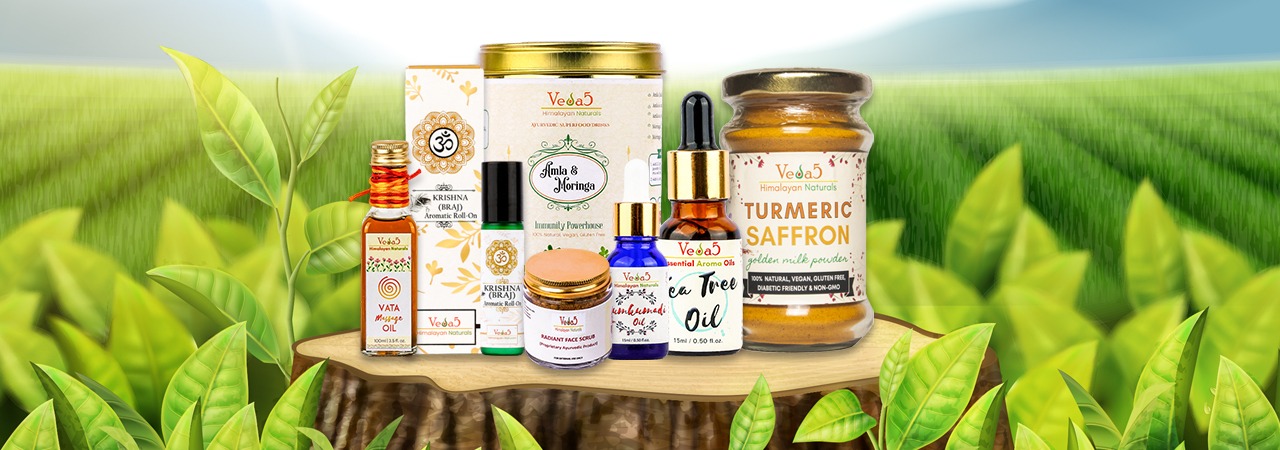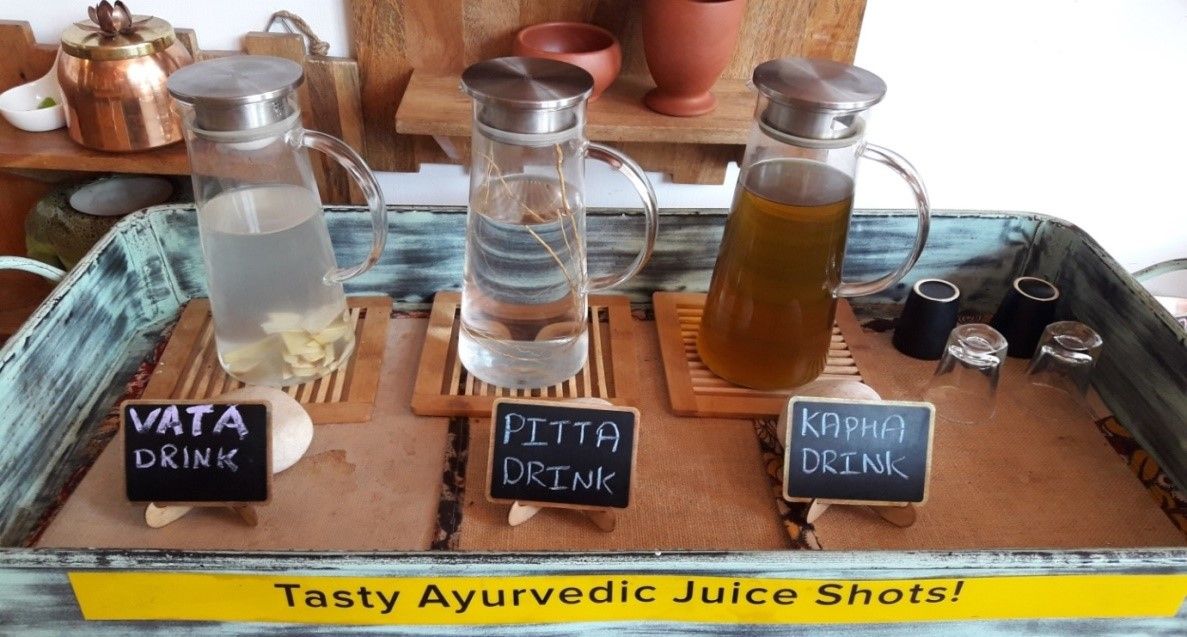Tridosha Theory According to Ayurveda: Balancing the Essence of Life by Veda5 Retreat in Rishikesh, Kerala & Goa, India

Introduction
Ayurveda, the ancient system of medicine that originated in India over 5,000 years ago, is deeply rooted in the concept of balance and harmony. At its core lies the Tridosha theory, a fundamental concept that serves as the cornerstone of Ayurvedic diagnosis and treatment. This theory postulates that the human body is governed by three primary doshas or vital forces: Vata, Pitta, and Kapha. Understanding the Tridosha theory is essential for comprehending Ayurveda’s holistic approach to health and well-being.
Following are the three doshas mentioned in Ayurveda:
वायुः पित्तं कफश्चेति त्रयो दोषाः समासतः॥६॥
विकृताविकृता देहं घ्नन्ति ते वर्तयन्ति च ।
Which means – Vata, Pitta and kapha are the three Doshas of our body. Perfect balance of three Doshas leads to health, imbalance in Tridosha leads to diseases.
Vata Dosha
Vata is the dosha associated with the elements of air and ether (space). It is responsible for movement, both physical and mental, within the body. When Vata is in balance, it promotes creativity, vitality, and enthusiasm. However, an excess of Vata can lead to anxiety, restlessness, and digestive issues. Ayurvedic remedies for imbalanced Vata include warm, nourishing foods, regular routines, and grounding practices like yoga and meditation.
Qualities of Vata
- Vata is dry, cold, short, subtle and devoid of stickiness.
- Rukshana means dryness etc. is natural properties of Vata.
- Due to the balance of Vata, the flow of blood and faeces and urine flow properly in the body.
- The movement of fluids, food, nutrients etc. inside body, and the gastrointestinal tract is due to Vata.
- Locomotion activities such as walking, limb movements are due to Vata.
Pitta Dosha
Pitta is associated with the elements of fire and water. It governs metabolism, digestion, and transformation in the body. In balance, Pitta promotes intelligence, courage, and a sharp intellect. Excessive Pitta can result in anger, inflammation, and digestive disorders. To pacify Pitta, Ayurveda recommends cooling foods, stress management techniques, and meditation to maintain emotional equilibrium.
Qualities of Pitta
- Pitta Dosha is often compared to fire.
- A little oily and unctuous. To light a fire, you will need oil or ghee to fuel the flames. The fire will grow if you add oil to it and that’s the reason pitta is responsible for digestion part.
- Pitta can penetrate deep into the body tissue because it is composed of fire and water.
- Pitta Dosha – Hotness – All warm factors of the body are influenced by Ushna.For example, the digestion and body temperature also.
- Pitta Dosha influences all metabolic activities that generate energy.
- Pitta is also increased when there is an elevation in temperature (e.g. fever).
- Lightness – Pitta is made up of fire and water components. The fire part is more important than the water, so lightness is also a quality.
- Bad breath – Pitta Dosha is often responsible for bad breath. Pitta can also influence bad smells in urine and faeces.
- Pitta also has fluidity and liquidity.
Kapha Dosha
Kapha is linked to the elements of earth and water. It provides structure and stability to the body. Balanced Kapha imparts qualities such as compassion, patience, and strength. However, excessive Kapha can lead to lethargy, weight gain, and respiratory issues. Ayurvedic approaches to balance Kapha include a diet rich in warm, light foods, regular exercise, and stimulating activities to invigorate the mind and body.
Qualities of Kapha
- Unctuousness and oiliness – The oily factor provides lubrication.
- Kapha factors are all the lubrication agents in joints (synovial liquid), vertebral discs, cerebrospinal fluid around and around the brain, pleural, etc.
- Kapha is responsible for oily skin
- Kapha is generally increased by oily foods, oily foodstuffs, and deep-fried food.
- Cold is due to both Kapha Doshas and Vata Doshas.
- Kapha is increased by cold food items like cucumbers, ice cream, and frozen food.
- Heaviness – Kapha is known to have a strong influence on heavy people. Heaviness in the head is an example. Kapha is influenced by a heavy body or overweight.
- Kapha’s body type is mild and viscous. They are prone to delay in feeling emotions, understanding, and delay in expressing them. These types of people take a lot longer to make decisions. He walks slowly.
- Kapha is known for its smoothness and jelly-like qualities.
- Kapha Dosha is known for his clarity. Although it may take some time for a Kapha person to fully understand and decide his beliefs, the majority of them will eventually do so. His sclera (white portion of the eye) is usually clear and white. There are no prominent blood vessels.
- Kapha Dosha is responsible for stability and immobility. Kapha Dosha has a strong influence on stiffness. Kapha is influential in Amavata (rheumatoid arthritis).
Balancing the Doshas
Ayurveda’s primary goal is to maintain or restore balance among the doshas. This is achieved through various means, including dietary adjustments, lifestyle changes, and herbal remedies. Ayurvedic practitioners assess an individual’s dosha constitution (Prakriti) and any current imbalances (Vikriti) to create personalized treatment plans.
1. The Role of Diet
Diet plays a crucial role in balancing the doshas. For example, a Vata-pacifying diet includes warm, nourishing foods like soups and stews, while a Pitta-pacifying diet emphasizes cooling foods like cucumbers and mint. Kapha individuals benefit from warm, spicy foods that stimulate digestion. Ayurveda also recommends mindful eating practices to enhance digestion and absorption.
2. Lifestyle and Mind-Body Practices
Maintaining a consistent daily routine, or dinacharya, is vital for dosha balance. Additionally, yoga and meditation practices tailored to one’s dosha can help maintain physical and mental equilibrium. Abhyanga, the practice of self-massage with warm oils, is also employed to balance the doshas and promote relaxation.
3. Herbal Formulations
Ayurveda employs a wide range of herbs and herbal formulations to address dosha imbalances. These include herbs like ashwagandha to balance Vata, aloe vera for Pitta, and ginger for Kapha. These remedies are chosen based on the individual’s constitution and specific imbalances.
Conclusion
The Tridosha theory in Ayurveda is a profound framework that guides practitioners toward a holistic understanding of health and wellness. By recognizing the unique interplay of Vata, Pitta, and Kapha in an individual’s constitution, Ayurveda offers personalized solutions to achieve and maintain optimal health, making it a timeless and valuable system of medicine.
Ayurveda Doctors at Veda5
Ayurvedic management and treatment is possible only under the supervision of qualified and expert doctors.
At Veda5 Ayurveda & Yoga Retreat in Rishikesh, Kerala and Goa, India, we will give you the team of Ayurvedic experts who will help you to manage and treat alcoholism and change your life with their expertise.
Best Ayurveda & Yoga Retreat in India
Guests from around the world have rated Veda5 as a top Ayurveda and Yoga retreat in Rishikesh, Goa and Kerala, India. Veda5 offers a holistic approach to health and wellness. By focusing on balance and harmony between the mind, body, and spirit, Ayurveda and Yoga aim to promote optimal health and disease prevention. From massage and detoxification to diet and lifestyle recommendations, Ayurveda offers a wide range of natural therapies that can help support overall health and wellness.
World Class Ayurveda & Yoga Retreats
Veda5 Ayurveda & Yoga retreats are located in Rishikesh, Goa and Kerala. The wellness retreats are run by highly-experienced doctors and offer authentic treatments and customized care for each guest. Veda5 Yoga and Meditation retreats are led by experts and the sessions range from gentle to vigorous to stretch, strengthen, balance and improve the body and mind.
Veda5 Naturals manufactures high-quality Ayurveda and Herbal wellness products formulated in the Himalayas that are natural, non-toxic and unadulterated without synthetic and inorganic chemicals. Please explore and shop our wide range of products on www.veda5naturals.com Veda5 Naturals products also make as great gifts.
Please see the Packages menu on our website to learn in detail about Veda5’s well-designed Ayurveda and Yoga wellness and vacation packages in Rishikesh, Goa and Kerala for which our guests come from around the world to India.
Click here to learn more about wellness through traditional Ayurveda and Yoga in Rishikesh, Goa and Kerala.
Click here to send us your booking requirements. You’re welcome to contact us for more details.
Veda5 looks forward to hosting you soon!









